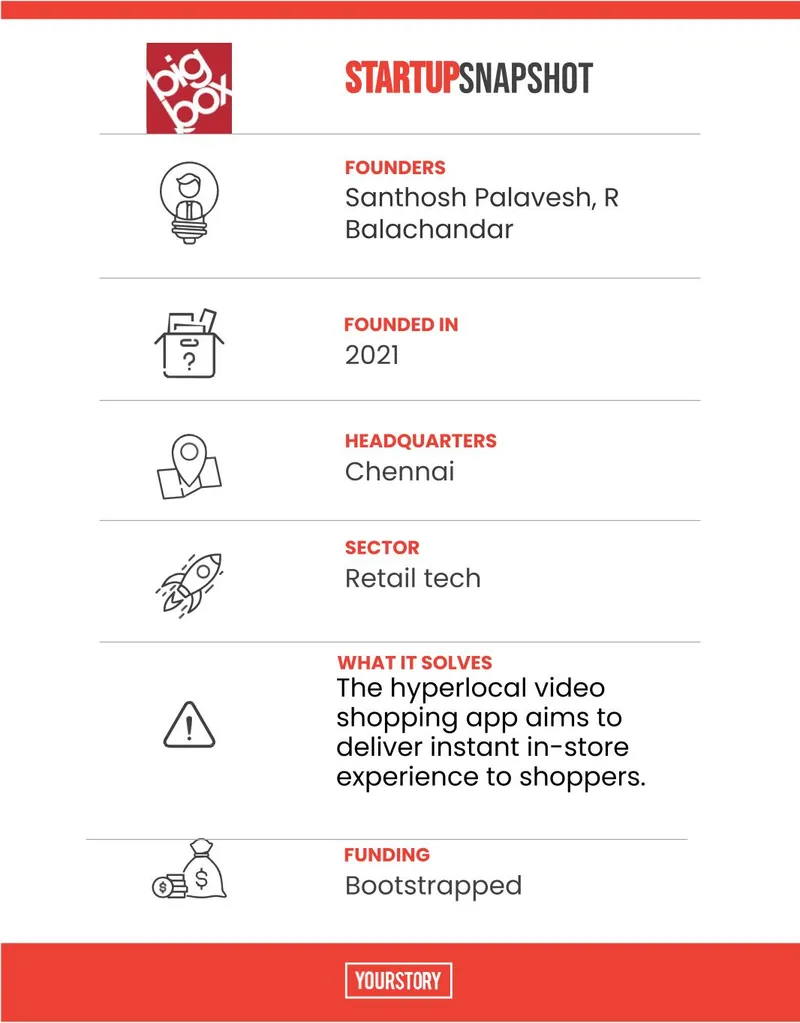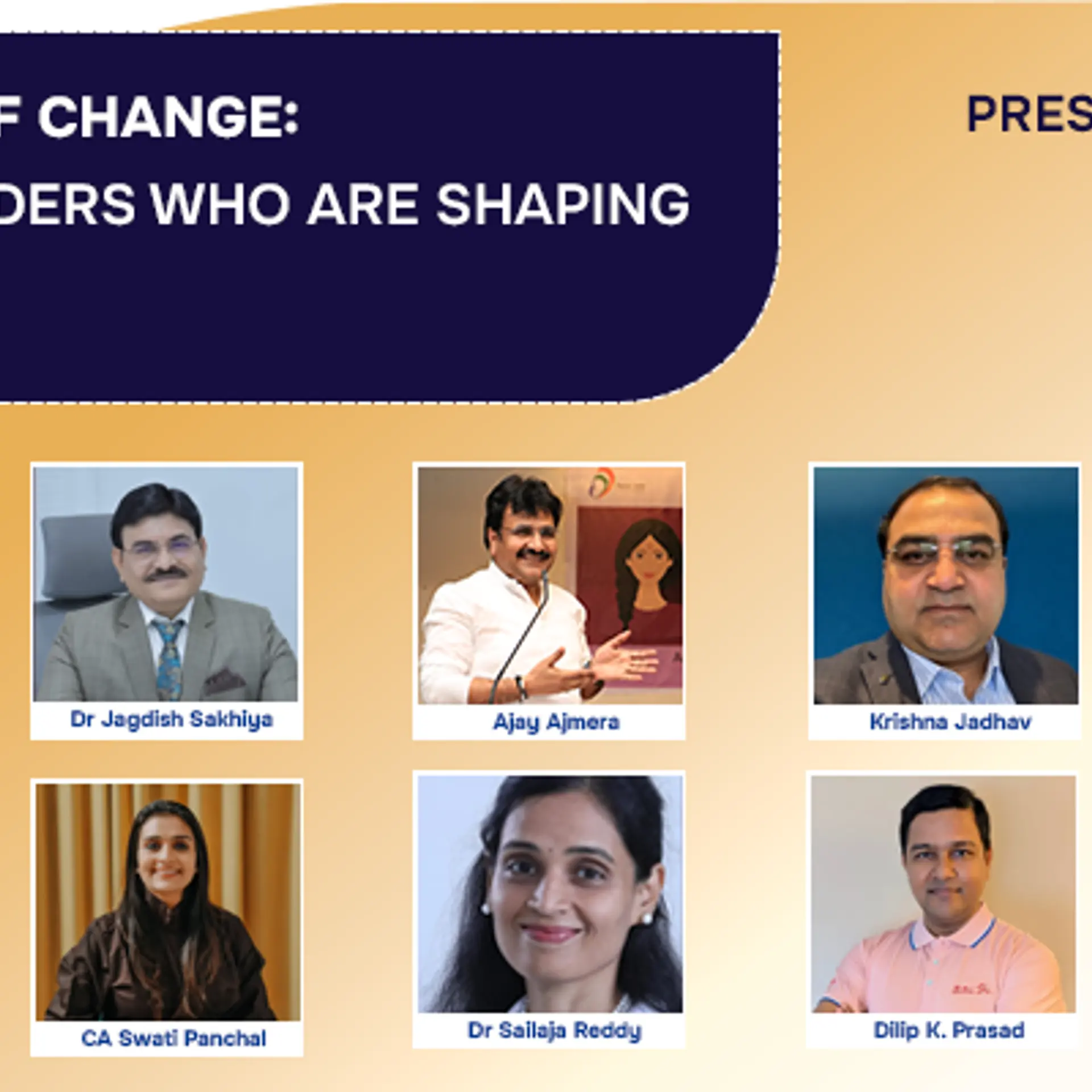[Tech50] How hyperlocal video shopping app Bigbox is disrupting the online retail landscape
Santhosh Palavesh, Co-founder, Bigbox shares how his retail tech startup is solving the pain points of online sellers and customers through a unique and interactive video-first model lending authenticity and value
In India’s dynamically changing retail landscape, Santhosh Palavesh disrupted the online marketplace with video shopping application, in 2021.
What is Santhosh solving through the Chennai-based Bigbox Retail Tech Solutions Llp that offers a hyperlocal shopping experience by enabling face-to-face video interactions between sellers and consumers? The platform runs by the motto: Instant in-store experience delivered.
Santhosh, an engineering graduate, and R Balachandar, a domain expert on branding and marketing, are the co-founders of Bigbox, one of YourStory’s Tech50 2021 startups.
Launched in May 2021, the company currently has 135 brands including Nykaa, Decathlon, Caratlane, Basics, Derby, Fossil across close to 20 categories including grocery. The top-selling categories are fashion, electronics, menswear, mobile phones, laptops, footwear etc. The platform has close to 5700 customers including both app download and web sign-up.
Santhosh explains the concept by taking us through the lifecycle and pain points of an online seller.
“Let’s say somebody has a boutique and he wants to sell online. You could either get an ecommerce site developed for your brand or set up your store in giant marketplaces such as Amazon, Flipkart, and the like, but they charge huge commissions and non-GST (Goods & Services Tax) players can’t register on those platforms. And even if a brand gets onboarded, it doesn’t automatically guarantee high search yields as it might appear in the 16th or 17th place or right at the bottom in terms of ranking,” explains Santhosh.
If a seller decides to take an online store, he has to buy a domain and a server, and even with relatively easier website development tools at one’s disposal today, one would still need a website developer to get it done. Then there is also the problem of product photoshoots and catalogue management to deal with.
Promoting the website is the next hurdle - what with mapping search engine optimisation (SEO) and navigating digital marketing. One has to also start spending money on social media platforms including Instagram, Facebook, and Google.

“A seller spends months developing a website, he struggles with catalogue management and Shopify data states that on an average, $41,000 is burnt in the first year by every ecommerce company to set up a base. An average seller fights trust issues and poor conversion rates. 90 percent of online businesses start failing because of poor conversion because they are unable to build trust. 10 percent continue to thrive out of which four percent emerge to be the big players,” adds Santhosh.
A customer spends hours of time browsing websites and doesn’t trust random websites. And, if at all the customer buys a product, he buys it on the basis of product photos, expecting to receive the same product. In case there is a mismatch the customer returns the product. 69 percent of customers are known to abandon their cart and they proceed to buy from an offline store, reminds Santhosh.
“So, shoppers need a better and faster way to shop. Shoppers need an experience and sellers need a platform through which they can offer the experience that they offer in a physical store. Most importantly, sellers need to sell on a platform where the catalogue management headache is not there. They want to sell on a platform where the conversion rate is higher and they sell using the most important asset that they have, which is talking and selling,” explains Santhosh.
Rather than customers walking into stores through technology, Bigbox brings stores into the palms of the customers. The video shopping platform enables shoppers to discover, follow and enjoy personalised shopping experiences at stores through video calls. The four aspects of the journey are: Video call and shop, discover brands, integrated payments, automated delivery.

The unique advantage
With many stories now providing services on WhatsApp, Santhosh says Bigbox’s USP is its user privacy. Just to give an example, a sales agent could screenshot a customer’s video run. “On our platform, you call a store but we don’t share your phone number or email id. And if a seller tries to screenshot you, we are alerted and penalise them. Only a customer can call the seller, the seller can’t call the customer. On WhatsApp, you get added to random groups and the app doesn’t deliver,” points out Santhosh.
Bigbox also has five sales agents, so a seller can address five customer calls parallelly.
The problem of giant perception
Often sellers find it challenging in setting aside a dedicated person who should be trained to attend to calls. The biggest challenge is in getting the seller to believe that this model will work and scale is the challenge. “We have had sellers raising doubts as to if they get 10,000 calls per day, how will they get 10,000 agents? First of all, if at all they get 10,000 calls that’s a good problem to solve. Let’s start getting 100 calls per day and making 1500 sales per day. It’s not like a showroom gets 10,000 visitors per day, it hardly gets 30 to 40 visitors,” explains Santhosh. So, the problem is that the moment people look at a solution, they think about it from a billion-dollar perspective whereas we should start with millions, he adds.
The first milestone or the achievement for Bigbox was to make the first brand believe that this model would work. “It’s not like sellers don’t want to invest in a dedicated resource for video calling, but usually they want to first see a competitor doing it,” shares Santhosh. Bigbox has also partnered with an HR company to get their brand’s resources to be placed in their premises to start selling through video.
“We are looking to heavily advertise in Chennai and Bengaluru once we have 500 brands on our platform. We are working with brands who are daring to explore this new form factor of shopping and we are looking at the champions in each category — with Shoppers Stop, every retail brand has to follow. With Caratlane every jewellery brand is expected to follow,” shares Santhosh.
Edited by Anju Narayanan


![[Tech50] How hyperlocal video shopping app Bigbox is disrupting the online retail landscape](https://images.yourstory.com/cs/2/0e302530227f11ec9e19b7c38d296967/BigboxEditedCopyofImageTaggingNewBrandingEditorialTeamMaster2-1641391743094.jpg?mode=crop&crop=faces&ar=2%3A1&format=auto&w=1920&q=75)
![[Tech50] This drone startup combines AI and tech to help solve for deforestation, medicine delivery, and sanitisation](https://images.yourstory.com/cs/2/a9efa9c02dd911e9adc52d913c55075e/MarutDrones-1640671082308.jpeg?fm=png&auto=format&h=100&w=100&crop=entropy&fit=crop)




